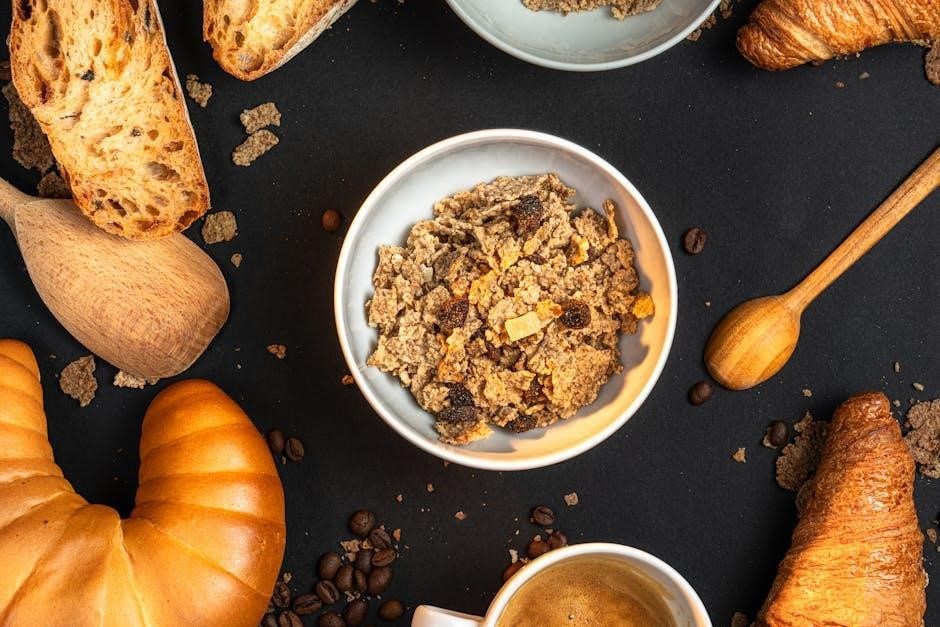The MIND (Mediterranean-DASH Intervention for Neurodegenerative Delay) diet is a hybrid of the Mediterranean and DASH diets‚ designed to promote brain health and reduce the risk of dementia. It focuses on consuming brain-boosting foods like vegetables‚ berries‚ nuts‚ whole grains‚ fish‚ and olive oil‚ while limiting unhealthy options. This dietary approach supports sharper memory and lower cognitive decline risk‚ making it a powerful tool for long-term brain wellness.

Key Components of the MIND Diet

The MIND diet emphasizes brain-boosting foods like vegetables‚ berries‚ nuts‚ whole grains‚ fish‚ and olive oil. It encourages moderate consumption of poultry‚ cheese‚ and wine‚ while limiting unhealthy choices such as fried foods‚ butter‚ and processed snacks. Staying hydrated is also crucial for overall brain health and cognitive function.
Focus on Brain-Boosting Foods
The MIND diet prioritizes foods known to enhance brain health and reduce cognitive decline. Leafy green vegetables like spinach‚ kale‚ and broccoli are rich in antioxidants and vitamins that protect brain cells. Berries‚ particularly blueberries and strawberries‚ contain flavonoids that improve memory and cognitive function. Nuts and seeds‚ such as almonds and walnuts‚ provide healthy fats and antioxidants that support brain function. Whole grains like oats‚ quinoa‚ and brown rice offer fiber‚ vitamins‚ and minerals essential for a healthy brain. Fatty fish‚ including salmon and mackerel‚ are high in omega-3 fatty acids‚ which are crucial for brain cell communication and inflammation reduction. Olive oil‚ a key component‚ promotes heart and brain health by improving blood flow. Incorporating these foods into your diet helps maintain sharp cognitive function and reduces the risk of age-related brain disorders. Aim for at least five servings of vegetables daily‚ with a focus on leafy greens‚ and include a variety of berries‚ nuts‚ and fish weekly. By emphasizing these brain-boosting foods‚ the MIND diet creates a foundation for long-term neurological wellness.
Avoiding Unhealthy Food Choices
The MIND diet emphasizes the importance of minimizing or eliminating certain foods that can negatively impact brain health. Fried foods‚ processed snacks‚ and pastries are high in unhealthy fats and calories‚ contributing to inflammation and oxidative stress. Red meat‚ particularly processed varieties like sausages and bacon‚ should be limited due to their association with increased dementia risk. Full-fat dairy products and refined sugars‚ often found in desserts and sweetened beverages‚ can also hinder cognitive function. Excessive alcohol consumption‚ especially wine‚ should be avoided to protect brain cells from damage.
By reducing these unhealthy food choices‚ individuals can lower their risk of cognitive decline and support overall brain wellness. The MIND diet encourages substituting these foods with nutrient-dense options like vegetables‚ whole grains‚ and lean proteins. Limiting unhealthy fats and sugars helps maintain a balanced diet that prioritizes brain health. Moderation is key‚ as even small changes can make a significant difference in protecting against age-related cognitive issues.
Importance of Hydration
Hydration plays a vital role in maintaining overall health‚ particularly brain function and cognitive performance. The MIND diet emphasizes the importance of staying hydrated to support brain health and prevent conditions like dementia. Water is essential for transporting nutrients‚ removing waste‚ and maintaining the structural integrity of brain cells. Even mild dehydration can impair focus‚ memory‚ and mood‚ making it crucial to drink enough fluids daily.
In addition to water‚ the MIND diet encourages consuming hydrating foods such as fruits‚ vegetables‚ and herbal teas. Foods like cucumbers‚ watermelon‚ and oranges have high water content‚ contributing to daily hydration needs. Incorporating these into meals and snacks helps maintain optimal fluid levels without relying solely on plain water.
The MIND diet suggests drinking at least 8-10 glasses of water per day‚ adjusting for activity levels and climate. Avoid sugary beverages and alcohol‚ which can dehydrate the body and negatively impact brain health. By prioritizing hydration‚ individuals can support cognitive function‚ reduce the risk of age-related brain decline‚ and maintain energy levels throughout the day. Staying hydrated is a simple yet effective way to enhance the benefits of the MIND diet and promote long-term brain wellness.
Benefits of Following the MIND Diet

The MIND diet offers numerous benefits‚ primarily focused on brain health and overall wellness. By incorporating brain-boosting foods and minimizing harmful options‚ individuals can significantly reduce their risk of cognitive decline and dementia. Studies have shown that adhering to the MIND diet can slow brain aging by up to 7.5 years‚ enhancing memory and cognitive function.
Beyond brain health‚ the MIND diet promotes a balanced and nutritious lifestyle. It encourages the consumption of antioxidants‚ fiber‚ and healthy fats‚ which support heart health and weight management. The diet’s emphasis on whole grains‚ fruits‚ and vegetables helps stabilize blood sugar levels and improve digestion. Additionally‚ its focus on lean proteins and omega-3 rich foods‚ such as fish‚ contributes to overall cardiovascular well-being.
The MIND diet is also associated with a lower risk of chronic diseases‚ including hypertension and type 2 diabetes. Its flexible structure makes it easier to follow long-term‚ as it allows for occasional indulgences and adapts to personal preferences. By prioritizing nutrient-dense foods and staying hydrated‚ individuals can experience improved energy levels‚ better mental clarity‚ and a reduced risk of age-related health issues. Overall‚ the MIND diet is a holistic approach to nutrition that supports both brain and body‚ making it a valuable choice for those seeking long-term health benefits.

Sample 7-Day MIND Diet Menu Plan
A 7-day MIND diet plan includes brain-boosting meals such as oatmeal with berries‚ grilled fish‚ and leafy greens. Lunches feature salads with nuts‚ while dinners include whole grains and vegetables. Snacks like nuts and fruit are encouraged‚ promoting a balanced and nutritious weekly menu that supports cognitive health and overall wellness.
Healthy Breakfast Options
Breakfast is a vital meal in the MIND diet‚ setting the tone for a day of brain-boosting nutrition. Start with a bowl of oatmeal topped with fresh berries and a sprinkle of walnuts for a combination of whole grains‚ antioxidants‚ and healthy fats. Another option is scrambled eggs with spinach‚ tomatoes‚ and a slice of whole-grain toast‚ providing protein and essential vitamins. Greek yogurt with blueberries and a handful of almonds is also an excellent choice‚ offering probiotics and a burst of antioxidants. For a refreshing start‚ try a smoothie made with spinach‚ frozen berries‚ and almond milk‚ then top it with granola for added crunch. Whole-grain pancakes or waffles with a drizzle of honey and fresh fruit are delicious and nutritious alternatives. Don’t forget to include a cup of green tea‚ which is rich in antioxidants and supports brain health; These breakfast options are designed to fuel your mind while keeping you satisfied and energized throughout the morning. By incorporating these meals‚ you can embrace the MIND diet’s focus on brain-friendly foods and set yourself up for a day of cognitive clarity and wellness.
Nutritious Lunch Ideas
Lunch is a key opportunity to refuel with brain-boosting foods on the MIND diet. A grilled chicken salad with mixed greens‚ cherry tomatoes‚ cucumbers‚ and a light vinaigrette is a satisfying and nutritious choice. Pair it with a side of whole-grain crackers or a slice of whole-grain bread for added fiber. Another option is a quinoa bowl loaded with roasted vegetables like broccoli‚ bell peppers‚ and sweet potatoes‚ topped with a drizzle of olive oil and a sprinkle of almonds. For a protein-packed meal‚ try a turkey and avocado wrap using a whole-grain tortilla‚ filled with spinach‚ sliced bell peppers‚ and a sprinkle of hummus.
A hearty vegetable soup made with leafy greens‚ beans‚ and whole grains is another excellent choice‚ paired with a side of mixed berries for dessert. If you prefer something lighter‚ a tuna salad (made with low-mercury tuna‚ Greek yogurt‚ and diced celery) served on a bed of mixed greens or whole-grain pasta is a great option. Don’t forget to incorporate a variety of colors on your plate to ensure a wide range of vitamins and minerals. A glass of water or herbal tea complements these meals perfectly‚ supporting hydration and overall brain health. These lunch ideas are designed to keep your mind sharp and your body energized‚ aligning perfectly with the MIND diet’s focus on brain-friendly nutrition.





